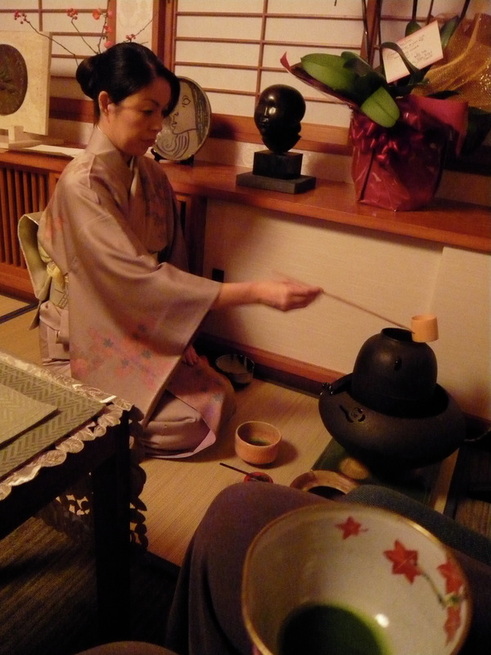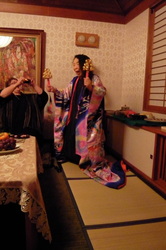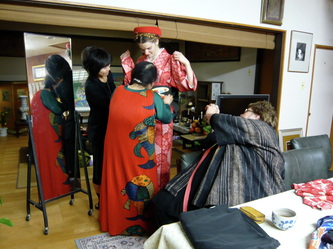Susan has just toured eight cities in Japan, so even though Tokiko wanted us to go sightseeing, we decided to go back to Sendai and let her sleep. The hills are covered with gold and crimson maples, and the side of the road is sprinkled with luscious kitchen gardens, each equipped with a stooped old lady with a headscarf, weeding. The sun was out, we sang rounds, and the world smiled.
Tokiko's son gave the three of us rooms at a 14-story hotel near the apartment (how are we ever going to thank these generous people?) and we tottered into our rooms and sat around with our mouths hanging slightly open until evening, chatting, sewing, or napping as the mood hit. Nobody has been sick yet and we hope these hours of peace will help it stay that way.
At 5, we were due at Tokiko's house in the hills. "Just a little snack, and we can go out for sushi later," she told us. "軽食." When we arrived, her 7-year-old granddaughter Nanaka greeted us in a glaringly pink kimono with a green obi. Her grandfather was going to sing a welcoming song for us.
He was a doctor who ran a successful clinic for decades. Now, his suit hangs from his bony frame, and he slicks his long black hair down nervously as he peers through heavy glasses. He doesn't speak much, but when he laughs it's clear that he follows most of the English and has a generous heart. He took a thin, floppy-paged book that looked like it was a hundred years old, folded it back, and began to sing. The hairs on my arms prickled. In his quavering, resonant old man voice, the unfamiliar scale and lugubrious swoops of the music sounded as though it came right from the early Neolithic.
Nanaka and her mother Mariko, in a greyish pink kimono, did a traditional tea ceremony for us. It was a sweet thing, silent but not stiff, with ritual movements for wiping out the bowls, ladeling the water from the pot on the charcoal burner, scooping the tea powder from its special box, and whisking the tea into foam. We received our tea bowls with both hands, and then were instructed to make the left hand like a plate and cup the right hand around the bowl. You turn the bowl so as not to seem greedy and so as to admire it, and then drink. When you're finished, you slurp the last bit so the hostess knows to get ready to prepare another bowl for you. Nanaka flitted around, bringing trays with special candies in the shape of natural objects specific to fall; pine cones, chrysanthemums, maple leaves. Each was sweet but textured in a different way. We sipped and ate, and Yayoi, Tokiko, her husband, and her cousin watched us do it. Sounds uncomfortable but it wasn't. Everyone was chatting cheerily and we felt cherished instead of on display.
When the tea ceremony finished, we were seated around a table and given four plates of home food, nothing special, just something to keep us from dying of hunger before we went out for sushi. A tray of shoyu-soaked ginger, another of sliced persimmons, one of something pink, and one of daikon. We ate, chatted, and didn't die of hunger.
Susan got out a musical instrument from India, like a one-chord accordion, and played a drone. She sang a mournful free-wheeling melody, and after a few minutes of that, Tokiko arrived in a dance kimono and fan. The kimono was blue with a vivid red lining, and dragged about four feet behind her on the floor. Her thin old-lady hair hung in a frizz around her face, her lips were scarlet, and she looked about as eerie as a generous extraverted old lady can look. She matched her dance to Susan's melody, and wow.
Next came a huge bowl of sugared beans, and miso soup loaded with simple country foods like yams, daikon, carrots, daikon, pork, daikon, and seaweed sprinkles. Carrots and beans, fried rice, and mysterious things on small square plates appeared. Nothing complicated, just simple home cooking, just a little snack to keep us until we went out to sushi.
Nanaka decided she wanted to participate. She played us a waltz on the piano and everyone swayed back and forth and waggled their fingers in time.
Time to change venues. We all trooped into the living room, a less formal meeting area, and had some bread with cheese and salami, washed down with juice. Not an actual meal, just to tide us over until our trip to the restaurant. We were going to try on the kimonos that Tokiko had helped us select from the secondhand store yesterday.
Tokiko helped me into mine, a traditional Okinawan silk robe with designs representing the tropical world there. One belt to keep it up off the floor, another belt to keep the fold from flopping around. Then she rushed off and rushed back with a wide obi out of gold thread. This was an obi she'd danced in when she was younger, but she doesn't do that dance anymore so I need to have it, no arguments. I'm not sure how the obi was attached, but it involved a brilliant pink stomach stiffener, two turns around my waist, and two people fussing at the back.
Camilla's kimono experience was more formal. She got several belts, and a multi-pronged fabric thing that held the obi bow in place properly, and a little bum roll wrapped in scarlet. You have to wait for the photos to appreciate it properly, but here I will merely say that everyone cooed, "kawaii, kawaii," ("cute, cute") a zillion times when she was ready for inspection.
Then we had some fruit cake, with green bits and some mineral water.
This inspired Tokiko. She vanished and came back with a mountain of fabric. "Here," she said, and handed me an Indonesian muumuu batiked in green. "Here," she said to Camilla, and gave her a stack of kimono belts. "Here," she said to Susan, and gave her a different Indonesian muumuu. "Here," she said to me, and gave me a yukata (informal kimono) in pale green. This went on for some time. People laughed and protested and were overruled and learned how to tie bows, fold fabric properly, and cup their hands over their mouths modestly.
There was chestnut, pear, or tangerine jello.
New Year's decorations! These look remarkably like wheat weavings, but are made from twisted rice straw. There is the shimenawa, a thick rope that hangs from sacred objects like trees. There is also a smaller charm in the shape of a twisted rope ring, with straw hanging down from it. You untwist the straw just enough to insert paper for the kami, kelp for the ocean, and pine needles for the mountains. Then you hang it over doorways. "Take them with you," said Tokiko, and we gathered up armloads of rice straw.
Time for salami, cheese, bread, other bread, and sake. Kampai!
It was near midnight. "Okay, let's go out for sushi!" said Tokiko.
Alas for the adventure, this was not to be. We said our good-byes and motored off into the Japanese distance.



 RSS Feed
RSS Feed
